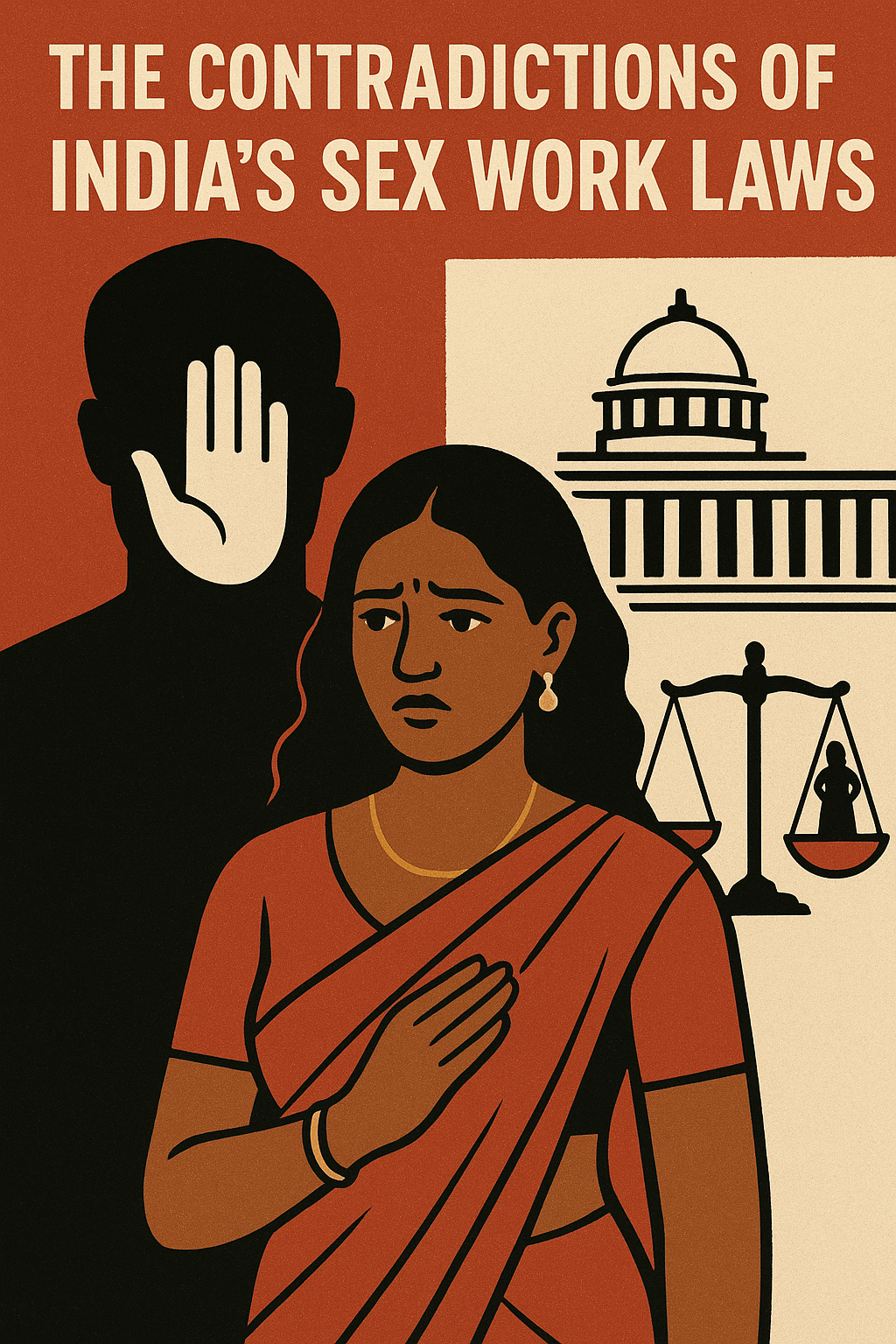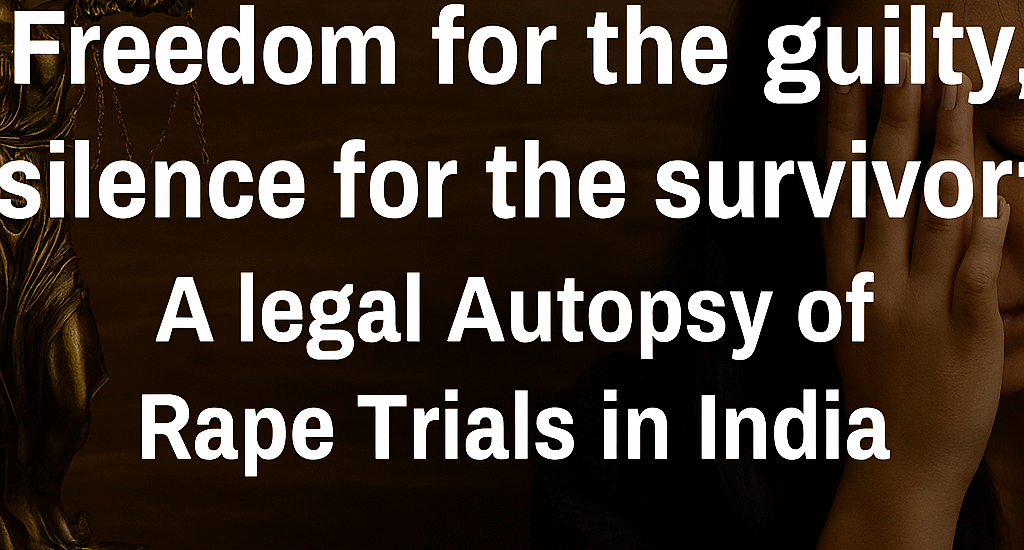



Author – Devanshe Nigam
College – Dr. K.N.K. Law College , Ratlam (M.P.)
In India, rape survivors often face a harsh and unjust reality where the guilty walk free, and the victims are left to suffer in silence. Despite numerous laws and legal reforms, including the Criminal Law (Amendment) Act, 2013, the justice system continues to fail many survivors.
Delayed trials, poor investigations, social stigma, and a lack of sensitivity within the legal process contribute to low conviction rates. Survivors are frequently doubted, shamed, and silenced, while the accused exploit legal loopholes and societal apathy to escape punishment.
The phrase “Freedom for the Guilty, Silence for the Survivor” is not just a critique but a reflection of a deeply flawed system. This article aims to uncover the layers of legal, procedural, and social challenges that rape survivors face in India.
Legal Provisions
India has several legal provisions aimed at addressing rape and sexual violence. Section 375 of the Indian Penal Code (IPC) defines rape, while Section 376 lays down the punishment, which can include a minimum of 10 years’ imprisonment to life, depending on the gravity of the crime.
Following the 2012 Nirbhaya case, the Criminal Law (Amendment) Act, 2013, was enacted to broaden the scope of sexual offences and ensure stricter punishment. This amendment introduced legal recognition of crimes like stalking, voyeurism, and acid attacks.
Additionally, the Protection of Children from Sexual Offences (POCSO) Act, 2012, ensures a sensitive and child-friendly process for cases involving minors. However, despite strong legislation, poor investigation, lengthy trials, and insensitivity from authorities often lead to denial of justice. Survivors, especially from rural or marginalized communities, find the legal process inaccessible. Laws exist, but their poor execution often leaves victims without real protection or closure.
Why the System Fails Survivors
Despite having legal provisions, India’s justice system often fails rape survivors due to deep-rooted flaws and indifference. FIRs are delayed, medical evidence is compromised, and investigations drag on for years. Survivors are frequently met with insensitive police, medical professionals, and legal authorities who re-victimize them during the process.
The courtroom often becomes a place where the survivor is judged more harshly than the accused. Legal aid, mental health support, and protection are largely inaccessible, especially for marginalized women.
Many are pressured to withdraw complaints or face threats to their safety and dignity. The trial process itself is so slow and painful that by the time justice is served , if ever , it is too late. Some survivors lose the will to live, and others tragically take their own lives or die waiting. While the case lingers in court, the survivor is already dead—emotionally, socially, or literally—long before the verdict arrives.
Case Studies and Recent Examples
Many recent rape cases in India clearly highlight the deep flaws in the justice system. One such example is the RG Kar Medical College case (2024) in Kolkata, where a female student was allegedly gang-raped inside the college campus. The incident sparked nationwide outrage. Despite clear evidence, there were delays in arrests and the questioning of powerful individuals, exposing clear favoritism within the system.
Likewise, the June 25, 2025 incident involving the rape of a law student in Kolkata also reflected how justice is delayed. These cases reveal how the legal process often protects the powerful, while survivors continue to suffer in silence, struggling for fair treatment and timely justice.
Not All Men? But Every Woman Has a Story
The phrase “Not all men” is frequently used as a shield to protect the male identity, rather than addressing the issue of gender-based violence. While not every man is guilty, almost every woman carries a story of fear, trauma, or survival. Legally, this highlights a justice system that responds only after the damage is done, rarely preventing the crime.
Ask yourself – ever heard a woman ask a man, “Where are you going? Come with me, it’s not safe?” No, because safety is never a man’s burden. At the heart of this imbalance lies the fragile male ego, quick to feel attacked but slow to take accountability.
Instead of listening, many choose denial, making the survivor feel guilty for speaking out. Until society learns to prioritize women’s safety over defending masculinity, the law alone will never be enough to break this cycle of silence, fear, and injustice.
also read this article: Breaking the silence: on the legality of marital rape in India
Patriarchy in the Courtroom
Despite being a place of justice, the courtroom often mirrors the patriarchal mindset that dominates society. In rape trials, survivors are routinely subjected to invasive questioning about their clothing, behavior, and past relationships issues irrelevant to the crime but used to undermine credibility.
Legal arguments often focus more on the survivor’s character than the accused’s actions. Judges, lawyers, and even court staff may unconsciously reflect the biases that favor the accused, especially when he holds social or political power. This subtle yet powerful patriarchy transforms courtrooms into intimidating spaces where women are re-traumatized. The legal system, built by and for men historically, continues to carry remnants of gendered injustice.
Until gender sensitivity is ingrained in legal practice, true justice for survivors will remain out of reach , even within the very institutions designed to protect them.
Candle Marches and Social Outrage: Symbolism Without Substance
In the aftermath of heinous rape cases, candle marches and social media outrage often dominate public attention. While these acts reflect emotional solidarity, they rarely lead to meaningful legal reform or sustained pressure on the justice system. The public outcry fades within days, the media moves on, and the system returns to its slow, indifferent pace.
Survivors are left to navigate the legal maze alone, while the promises made during protests vanish. Where are the law enforcement reforms? Where is the accountability? Candlelight cannot replace courtroom action.
The need of the hour is not just temporary anger, but permanent structural change , strong implementation of laws, time-bound trials, and real consequences for negligence. Justice must not burn out like a candle. It must burn constantly until survivors are truly heard.
The Mockery of Consent
Consent stands at the core of rape laws, yet it remains ignored and misrepresented in India. Section 375 of the Indian Penal Code clearly defines rape as any sexual act without consent. However, society and courts often fail to respect a woman’s “no,” questioning her clothes, actions, or reasons for being outside, instead of focusing on the crime.
Many still refuse to accept that “no” simply means no , without the need for explanation or justification. This mindset shifts blame onto the survivor, while the real offenders walk free. Until society fully accepts that a woman’s “no” must always be respected, justice will remain denied, leaving countless survivors unheard and unprotected under the law.
Justice That Demands Proof of Pain
India’s justice system often demands survivors to prove their suffering, as though pain requires evidence to be valid. In many rape cases, survivors must endure harsh questioning, character assassination, and repeated retelling of trauma to be believed. The situation worsens when the survivor dies on the spot or shortly after the crime and leaving no voice to narrate the ordeal. In such cases, justice becomes painfully slow, taking years to deliver a verdict, often resulting in absurd or lenient punishments for the perpetrator.
Courts tend to focus on technicalities, overlooking the gravity of the crime itself. Families of deceased victims are left to fight an exhausting legal battle while the accused exploits loopholes to escape punishment. Justice loses meaning when it demands proof from those who can no longer speak, and when it moves too slowly to protect the dignity of the victim.
What Real Reforms Look Like
Legal reforms alone are not enough unless they are backed by strict and effective enforcement. Ensuring accountability in rape cases demands more than amendments on paper. The criminal justice system must ensure that FIRs are filed without delay, forensic investigations are completed swiftly, and trials are concluded within a clearly defined timeframe under proper judicial oversight.
Laws like Sections 375 and 376 of the Indian Penal Code need strict execution to prevent delays and ensure justice. Should stablish exclusive fast-track courts specifically for rape cases is essential to speed up the process. Without such urgent measures, legal provisions remain ineffective, allowing offenders to exploit loopholes and delaying justice for survivors.
Survivors Speak, Society’s Silence
Survivors of sexual violence often struggle alone, while society responds with apathy or momentary outrage. Justice becomes meaningless when it arrives too late, after prolonged suffering. A lesser-discussed example is the tragic incident in Hathras in 2020, where a young woman faced a brutal assault that led to her death after battling severe injuries. Shockingly, officials denied her family the right to perform her last rites, igniting brief nationwide protests. Yet, as days passed, the public’s focus shifted, leaving the victim’s family to endure the fight for justice alone.
This case highlights how even the most horrifying crimes are soon forgotten. Delayed trials, lack of protection for families, and vanishing public support weaken the quest for justice. When society forgets, survivors or their families are left to carry unbearable burdens with little hope of closure.
Why Questioning a Woman’s Presence Outside Is Misplaced
It is unfair and legally irrelevant to ask why a woman was outdoors late at night after a crime against her. This question unjustly redirects the focus from the accused to the survivor. Such arguments emerge from deep-seated patriarchal ideas that aim to limit women’s freedom, often disguised as concerns for safety.
Every individual, regardless of gender, holds the constitutional right to move freely, at any time of day or night. When legal discussions center on the survivor’s presence or clothing, they undermine the real issue and accountability of the offender.
No woman invites violence by merely stepping outside her home. Justice systems must ensure that investigations focus only on the crime committed, not the survivor’s personal choices. The law’s responsibility lies in protecting rights, not policing women’s behavior.
Conclusion: Whose Freedom Does the Law Truly Safeguard?
The justice system must shift its focus from questioning the actions of rape survivors to holding offenders fully accountable. If a nation can enforce lockdowns overnight and implement demonetization within hours, then why can’t rapists face immediate punishment under strict legal supervision? Swift and decisive justice can deter future crimes and uphold women’s right to live without fear.
True justice requires urgency, fairness, and protection of human dignity. Until such prompt actions are normalized, the law will continue to shield privilege rather than act as a force for justice, leaving survivors to struggle in silence.
Reference
The Hindu Report.
Criminal Law (Amendment) Act, 2013.
NCRB Reports 2023 – Crime Against Women.